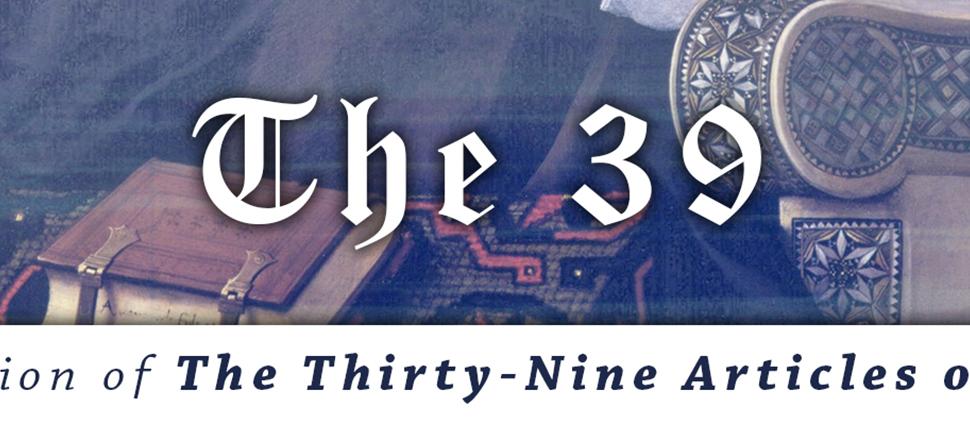The 39: A Christian Man's Oath

We complete our study of the Thirty-Nine Articles at Article 39, which also concludes its final topic: The relationship between the Christian and the commonwealth. Article Thirty-Nine addresses the distinction between the permissible swearing of an oath from rash and profane swearing forbidden by the third of the Ten Commandments.
ARTICLE XXXIX — OF A CHRISTIAN MAN’S OATH
As we confess that vain and rash Swearing is forbidden Christian men by our Lord Jesus Christ, and James his Apostle, so we judge, that Christian Religion doth not prohibit, but that a man may swear when the Magistrate requireth, in a cause of faith and charity, so it be done according to the Prophet’s teaching, in justice, judgement, and truth.
Articles 37-39 were retained from Cranmer’s original 1553 Forty-Two Articles that were directed against the teaching of the Continental Anabaptists. The articles omitted in Matthew Parker’s 1563 revision concern soul sleep (1553/40), premillennialism (1553/41), a completed “spirit” resurrection (1553/39), and universalism (1552/42). Most argue that the omission of four articles was due to a changing religious/political map of the 16thcentury. What was thought a threat to the peace of the realm in anabaptist revolution in 1553 was less so by 1563. Such an argument may give a partly historical context, but we should also recall how the serious errors of soul sleep, literal premillennialism leading to moral license or rebellion, a "spiritual" or non-bodily resurrection, and universalism are still taught at present, either in heretical sects or in heretical mainline liberal denominations.
The wording of the article is unchanged from Cranmer’s original. Parker’s revision inserts a possessive pronoun "his" to underline that Christ and James are not of equal authority. For the final time, we may note our two principles: the doctrine of sola scriptura and the necessity in reading the historical formularies as a whole. Article 39 also summarizes the teaching of the seventh homily of the First Book of Homilies, Against Swearing and Perjury.
Homily Seven sets out the argument in two parts. The first part explains that lawful swearing is not only permitted by God but commanded by him in Deuteronomy 6.13. Swearing is permissible in a court of law, in a contract, in holy matrimony, and in assuming public office. The Lord Jesus Christ also would preface his remarks with an oath, “Verily, verily,” and the Apostle Paul likewise in 2 Corinthians 1.23 when he called upon God as his witness. It explains that a lawful secular oath must have the three biblical hallmarks as found in the vows taken in baptism and marriage. When these three are present, God is glorified:
- The one who swears must tell the truth without partiality.
- The one who swears must do so advisedly and soberly, after serious thought.
- The one who swears must do so out of a zeal for truth and justice.
Therefore, a lawful swearing of an oath cannot be evil, because it is born in faith and love of neighbor, and its purpose is to accomplish many good and godly results (justice, judgment, and truth). The Lord Jesus prohibited rash, vain swearing (Matthew 5.33-37) as did the Apostle James in his letter (James 5.12). Such swearing holds God and neighbors in contempt.
The second part gives the pastoral application. Lawful oaths must be kept, as there are many Old Testament examples of the judgment that follows promises broken. Vows made contrary to God's law and neighbor must not be kept. Perjury is forbidden, because to break an oath sworn on God's Word is to curse it, rejecting both God's self-revelation, his commandments, and his promises.
Cranmer’s Reformatio Legum likewise repeats the sum of the article and the homily:
Furthermore, the Anabaptists even give up the lawful use of oaths, in this matter going against the teaching of the Scriptures and the examples of the fathers of the Old Testament, as well as the Apostle Paul, and even of Christ, even of God the Father, whose oaths are often recorded in Holy Writ (Bray, Tudor Church Reform [2000], p.201).
The Heidelberg Catechism, published in the same year as the Thirty-Nine Articles, takes a similar position in its question 101:
But may we swear an oath by the name of God in a godly manner? Yes, when the government demands it of its subjects, or when necessity requires it, in order to maintain and promote fidelity and truth, to God’s glory and for our neighbor’s good. Such oath-taking is based on God’s word and was therefore rightly used by saints in the Old and the New Testament.
For most of human civilization, oath swearing was the corner-stone of both the political and spiritual world. One could argue that the Protestant Reformation in the 16thcentury came about through the swearing of oaths and promises to confessions of faith and secular princes. On the 4thof July Americans are reminded how 56 men in support of a Declaration of Independence “mutually pledge our Lives, our Fortunes, and our sacred Honor" to the cause of freedom from the tyranny of the British Crown.
But to swear an oath of loyalty or obedience today, except in the military or in a court of law which exact penalties if broken, has little weight. Oaths taken at ordination or in the installation of the clergy are done with little thought as to the bearer's responsibility to keep the promises, to understand thoroughly what they have promised or to accept the consequences if their oaths are broken. How many ministers stand with "fingers crossed" when mouthing the words of an affirmation that they disagree? How many remain in an office rather than resign when the oath they took upon ordination is no longer in their best interest to keep?
Henry Jansma (@VicarsGarden) is rector of All Souls Anglican Church in Cherry Hill, New Jersey, and canon theologian for the Diocese of the Living Word in the Anglican Church of North America (ACNA)





